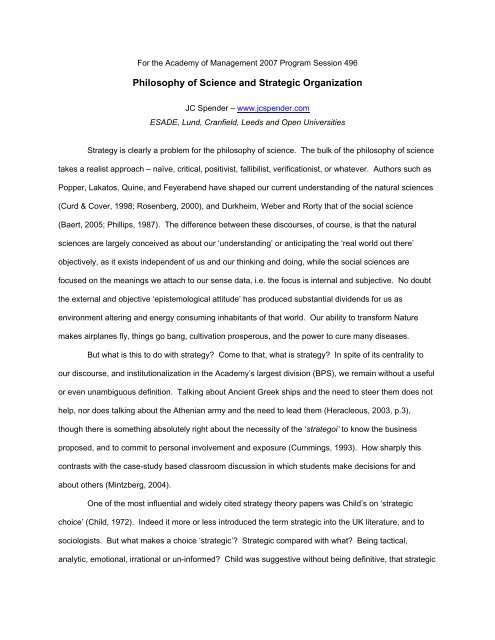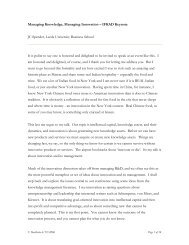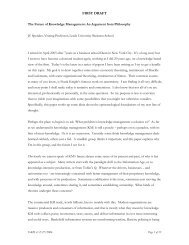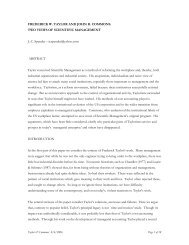PHILOSOPHY OF SCIENCE AND STRATEGY - JC Spender
PHILOSOPHY OF SCIENCE AND STRATEGY - JC Spender
PHILOSOPHY OF SCIENCE AND STRATEGY - JC Spender
Create successful ePaper yourself
Turn your PDF publications into a flip-book with our unique Google optimized e-Paper software.
For the Academy of Management 2007 Program Session 496<br />
Philosophy of Science and Strategic Organization<br />
<strong>JC</strong> <strong>Spender</strong> – www.jcspender.com<br />
ESADE, Lund, Cranfield, Leeds and Open Universities<br />
Strategy is clearly a problem for the philosophy of science. The bulk of the philosophy of science<br />
takes a realist approach – naïve, critical, positivist, fallibilist, verificationist, or whatever. Authors such as<br />
Popper, Lakatos, Quine, and Feyerabend have shaped our current understanding of the natural sciences<br />
(Curd & Cover, 1998; Rosenberg, 2000), and Durkheim, Weber and Rorty that of the social science<br />
(Baert, 2005; Phillips, 1987). The difference between these discourses, of course, is that the natural<br />
sciences are largely conceived as about our ‘understanding’ or anticipating the ‘real world out there’<br />
objectively, as it exists independent of us and our thinking and doing, while the social sciences are<br />
focused on the meanings we attach to our sense data, i.e. the focus is internal and subjective. No doubt<br />
the external and objective ‘epistemological attitude’ has produced substantial dividends for us as<br />
environment altering and energy consuming inhabitants of that world. Our ability to transform Nature<br />
makes airplanes fly, things go bang, cultivation prosperous, and the power to cure many diseases.<br />
But what is this to do with strategy? Come to that, what is strategy? In spite of its centrality to<br />
our discourse, and institutionalization in the Academy’s largest division (BPS), we remain without a useful<br />
or even unambiguous definition. Talking about Ancient Greek ships and the need to steer them does not<br />
help, nor does talking about the Athenian army and the need to lead them (Heracleous, 2003, p.3),<br />
though there is something absolutely right about the necessity of the ‘strategoi’ to know the business<br />
proposed, and to commit to personal involvement and exposure (Cummings, 1993). How sharply this<br />
contrasts with the case-study based classroom discussion in which students make decisions for and<br />
about others (Mintzberg, 2004).<br />
One of the most influential and widely cited strategy theory papers was Child’s on ‘strategic<br />
choice’ (Child, 1972). Indeed it more or less introduced the term strategic into the UK literature, and to<br />
sociologists. But what makes a choice ‘strategic’? Strategic compared with what? Being tactical,<br />
analytic, emotional, irrational or un-informed? Child was suggestive without being definitive, that strategic
choice was reflective of those making the choice, therefore somewhat subjective and certainly not wholly<br />
‘objective’. Nonetheless there are legions of strategy writers and researchers, and especially of strategy<br />
text writers, who seem to believe we can proceed on the basis of examining ‘the facts’ of the firm’s<br />
environment and determining ‘the best way’ for us to proceed, i.e. observing, analyzing, planning and<br />
executing within a rigorous and logical framework. Their philosophical commitments are evident in<br />
neologism-packed books and papers pouring forth along these lines.<br />
It is easy to forget this goal-oriented decision-making paradigm is relatively new and was ushered<br />
in during the 1960s by the folks at Carnegie Mellon University who thought, given World War II and its<br />
apparent Operations Research successes, that rigorous modeling was the way to go. Yet even then<br />
there was a struggle between causal analysis and the older strategic paradigm presented in those blue<br />
Learned, Christensen, Andrews and Guth volumes (Learned, Christensen, Andrews, & Guth, 1965). The<br />
Harvard approach argued ‘strategy’ was less a matter of rational planning than of choosing, in Child’s<br />
sense, and that it called for executive imagination and leadership rather than quantitative analysis.<br />
Indeed strategy only mattered when rational analysis was not definitive. Thus strategy complemented<br />
rational decision-making and was neither a qualifying term to describe the decision-making of senior<br />
people nor that about serious long-term matters.<br />
Taking their cue from John Commons (Commons, 1924), L, C, A, & G assumed the strategic<br />
process was less one of observing and analyzing than of reconciling the often contradictory pulls of what<br />
the executives – as the agents of the owners – ‘wanted to do, might do, could do, and ought to do’. With<br />
this notion of strategy, the objective function underpinning the ‘rigorous’ model – say, maximizing<br />
shareholder wealth – is modified or mediated by other concerns, such as the executives’ own objectives,<br />
the employees’ interests, or the host society’s expectations. These additional objectives hugely<br />
complicate the strategy process, introducing principal-agent issues and taking the process well beyond<br />
the tangible and bounded limits of managerial rationality.<br />
This complexity, and the difficulty of dealing with it, was one of several drivers behind the<br />
popularity of Porter’s 1980 work. He re-framed the strategy problem, transforming it from the planning<br />
and reconciling process within LCAG’s multi-dimensional universe into that of protecting a monopoly<br />
position already established. No longer was strategy about the whole process, rather it was narrowed to<br />
2
address the specific attack being mounted by suppliers or new entrants. Were these attacks on the rent<br />
stream to occur simultaneously, of course, the framework became little more than descriptive. But given<br />
the Porter framework managers could argue that ‘doing strategy’ meant spending less time worrying<br />
about how the firm acquired the rent streams it possessed, and more time worrying about how to protect<br />
them against those others with the economic power to dislodge them. The ‘facts’ of the context were redefined<br />
in terms of the economic power to disturb the firm’s rents. Paradoxically, the extension of Porter’s<br />
work into the RBV exposes the fruitlessness of reframing strategy as the process of searching and<br />
securing these rents streams, for the rent-sourcing complexities suppressed in Porter’s analysis are<br />
surfaced into plain view. In a similar move the proponents of stakeholder theory have become aware<br />
there are no obvious ways of dealing with the stakeholders’ multiple and, at times, contradictory,<br />
objectives within a coherent deterministic model of the type demanded in most of our journals.<br />
Ironically our discipline’s philosophical challenge is to make a strategic choice about strategy<br />
itself, to find ways of re-framing the executive problem in ways that are tractable rather than intractable,<br />
that open up rather than collapse the discourse into its own contradictions. So I see no purpose<br />
pretending strategy is a form of rational planning. Strategy has always implied human actors securing<br />
advantages over their competitors by leveraging the non-rational, that which falls outside the rational<br />
analysis. After all, our competitors can surely plan as well as we. So long as we do not disrespect our<br />
competitors and define them as not competent enough to do their own planning we seem stuck. In short,<br />
I see no way to locate the term ‘strategy’ within the planning discourse in which it is so often popped.<br />
When 35 years ago I began studying to become a strategy theorist, driven by my managerial<br />
experience, and with John Child as one of my examiners, I took up a different paradigm, arguing that<br />
strategy-making was mostly about sense-making in difficult-to-comprehend situations. My military service<br />
in submarines, where diagnosing what is happening can mean the difference between tranquility and<br />
disaster, helped me to appreciate confusion and disorientation, and its deadly consequences. So to me<br />
strategy is about being attacked by the ‘unk-unks’, the unknown unknowns which occur in practice in spite<br />
of the most meticulous planning. Thus strategy is at its most meaningful in circumstances of bounded<br />
rationality. This obviously stands over and against a planning paradigm that emphasizes the processing<br />
of the data about the situation rather than its selection and acquisition. I was interested in how managers<br />
3
come to pay attention to this feature of the world rather than that, assuming their attention – and<br />
rationality – is limited and, as Barnard suggested, the ‘limiting’ resource. Some theorists, especially those<br />
brought up on game theory, would disagree and see strategy as perfectly compatible with a positivist<br />
frame, defining it as the route chosen through a series of decisions with an objective function in mind.<br />
Strategy is then a game to be played against one’s own ignorance and indecision, of not having decided<br />
the route. But when played against another, the game surely comes down to information differences and<br />
asymmetries, and so to whatever notions of ‘bounded rationality’ can be admitted into the game-theorist’s<br />
analysis.<br />
I wanted none of this, adopting instead a more subjectivist, phenomenological stance. Schutz<br />
became my guide (Schutz, 1944, 1945). Though it was not precisely what I intended, many people saw<br />
this as introducing ‘framing’ and ‘perception’ into the analysis of strategy. Had ‘behavioral economics’<br />
been more widely known at the time, we would have introduced it into the discourse, suggesting<br />
managers pay attention on the basis of ‘recency’ and so forth (Kahneman & Tversky, 1979). I was less<br />
focused on explaining the particular conclusions of the sense-making process than on its dynamics. In<br />
introducing the term ‘industry recipe’ (<strong>Spender</strong>, 1989), drawn from Schutz, I was proposing the sensemaking<br />
that shaped the firm’s strategic process was not, in fact, peculiar to the firm in question, as was<br />
universally presumed. The literature suggests each entrepreneur is unique, as is the resulting firm. The<br />
notion of industry recipe contradicts this, suggesting the underlying strategic process is at the level of the<br />
industry, or what we might now call the ‘community of practice’ which we sense as the group of actors<br />
comprising ‘the industry’ in a Marshallian sense rather than the SIC sense.<br />
The point here is not to rehearse these arguments, merely to show how the epistemological<br />
underpinnings shift as one moves from a goal-oriented planning paradigm into the active sense-making<br />
model that I was exploring. The philosophical underpinnings have switched from realism – in the sense<br />
that the data gathered and processed is about a objective ‘real world’ beyond the firm or its industry – and<br />
towards a subjectivist view in which the strategist, whether individual or collective, is constructively<br />
defining ‘the world’, and its relevant data, as s/he/it chooses or arrives at a particular strategic view of the<br />
firm. This follows necessarily as the possibility of gathering complete or comprehensive information about<br />
the situation retreats behind the veil of bounded rationality, in Simon’s sense.<br />
4
The risk inherent in this approach is that the whole discourse slides off into anarchic relativism. It<br />
seems the firm and its world can ultimately be defined in any way the strategist chooses. The planning<br />
metaphor seems designed precisely to stop this and prevent every firm considering itself unique and<br />
bound up by the irrationalities of its entrepreneurial founder/s. Absent some theoretical or methodological<br />
‘scientific’ or objective constraints standing outside and over those framing the situation ‘the way we do<br />
things around here’ is simply that, and it needs neither historical explanation nor warrant.<br />
Aside from our epistemic horror at such relativism, we have practical problems presenting this as<br />
either interesting or useful to ‘real managers’ who have a payroll to meet, customers and shareholders to<br />
serve, and so forth. Such real managers, tightly constrained in a world of consumable resources,<br />
intangible knowledge assets, and competition for the minds and wallets of their customers, do not have a<br />
free choice over the commercially viable ways of viewing of the world. Thus realism, critical, naïve or<br />
otherwise, seems a more practical philosophy than any variety of subjectivism – such as radical<br />
subjectivism or phenomenology. But at the same time realism cannot deal with the central feature of<br />
strategy or entrepreneurship, that of the observable process of creating a new world by creating new<br />
products, services, needs, and customers, as well as new uses for old resources. Paradoxically, as the<br />
natural sciences have revealed more of the way ‘the real world’ operates, so they have reminded us how<br />
the social world in which business actually happens is mediated and shaped by entrepreneurial choices<br />
about how to transform resources into services and how to create new demand for them.<br />
Where then can we find a useful and practical philosophical basis for an idea of strategy that is<br />
respectful of both the entrepreneurial manager’s ability to innovate - as Penrose’s work has illustrated<br />
supremely well - and of the constraints the ‘real world’ exerts over her/his imaginings? Resources matter,<br />
clearly. We may think the question new, something to do with today’s drift towards trust and respect<br />
within organizations and networks, or the Information Age, or Globalization, or whatever. This is too bad,<br />
because the question has been with us for centuries, often articulated through the notion of ‘human<br />
agency’, one of the oldest philosophical chestnuts. Once we assume we can change the world, that we<br />
are active participants in its construction rather than the passive victims of its state, we immediately<br />
confront that limits to our powers. At the same time we present the positivist view of the world as ‘out<br />
there to be analyzed and responded to’ with a grave philosophical challenge. Rather than existing<br />
5
objectively, independent of us and our doings, we posit our world rather than THE world as something we<br />
and others, and Mother Nature herself, are constantly creating. In this sense agentic activity is strategic,<br />
and to be strategic is to be agentic. To act rationally within a fully determined system, as implied in our<br />
scientific models, is to be non-strategic, tactical perhaps. At the same time, given the assumption of<br />
human agency there is no way of fully forecasting others’ reactions to our actions, for they cannot ever<br />
have full knowledge of our intentions and interpretations. Indeed we do not have such full knowledge of<br />
our own intentions and actions ourselves.<br />
As we wander through the philosophers’ supermarket various forms of constructivism seem<br />
relevant to the analysis of human agency or, as we now call it, our strategic choices. Again, there is<br />
tendency to think these epistemologies new, or post-modern, or in some way philosophically cuttingedge.<br />
This is not so. As von Glasersfeld points out (von Glasersfeld, 2002), it all goes back to<br />
Giambattista Vico, at least the European discourse does. Vico’s thinking has been an undercurrent of<br />
European thought for centuries and may well be one of phenomenology’s parents.<br />
But to make good use of constructivism rather than simply trumpet it we must find a mid-point,<br />
albeit tentative and shifting, between the power of the imagination – such as the entrepreneur’s – and the<br />
constraints the world exerts upon it. Our ability to be agentic ultimately springs from our ability to imagine<br />
what we cannot see before us. Thus strategy then becomes ‘the art of the possible’, framed somewhat<br />
like political theory. At the same time the horizon comes closer. No longer are we focused on the<br />
ultimate objective of our activity, establishing it as the basis for our rationality and testing everything<br />
against whether it moves us closer to that goal. The emphasis is on the here and now, on ‘local hillclimbing’,<br />
on Peircian indexicality, on what can be done right now with the resources to hand in the face<br />
of the difficulties and risks already identified.<br />
Whenever these risks arise from the activities of others, who are, after all, just like us, applying<br />
their imaginations within their constraints, it obviously serves us well to imagine ourselves into the mind of<br />
the enemy – as both Sun Tzu and von Clausewitz suggested. This established a different idea of the<br />
reality out there, no longer in as Mother Nature, rather as of the Other. Constructivism is thus always<br />
uneasily poised between subjectivism and realism. Its attraction is that it admits both. But its challenge is<br />
that it can only be made useful by de-universalizing it, grounding it in local situations and contexts which<br />
6
are inevitably incompletely comprehended. Such knowledge we now call ‘situated’ and it is in the manner<br />
in which our contexts of action are comprehended ‘situationally’ that we reach the real stuff of strategic<br />
choices.<br />
REFERENCES<br />
Baert, P. (2005). Philosophy of the Social Sciences. Cambridge: Polity.<br />
Child, J. (1972). Organisation Structure, Environment and Performance. Sociology, 6, 1-21.<br />
Commons, J. R. (1924). The Legal Foundations of Capitalism. New York: Macmillan.<br />
Cummings, S. (1993). The First Strategists. Long Range Planning, 26, 133-135.<br />
Curd, M., & Cover, J. A. (Eds.). (1998). Philosophy of Science: The Central Issues. New York: W. W.<br />
Norton & Co.<br />
Heracleous, L. (2003). Strategy and Organization: Realizing Strategic Management. Cambridge:<br />
Cambridge University Press.<br />
Kahneman, D., & Tversky, A. (1979). Prospect Theory: An Analysis of Decisions Under Risk.<br />
Econometrica, 47, 262-291.<br />
Learned, E., Christensen, R., Andrews, K., & Guth, W. (1965). Business Policy: Text and Cases.<br />
Homewood IL: Richard D. Irwin.<br />
Mintzberg, H. (2004). Managers not MBAs: A Hard Look at the Soft Practice of Managing and<br />
Management Development. San Francisco CA: Berrett-Koehler Publishers.<br />
Phillips, D. C. (1987). Philosophy, Science and Social Inquiry: Contemporary Methodological<br />
Controversies in Social Science and Related Applied Fields of Research. Oxford: Pergamon<br />
Press.<br />
Rosenberg, A. (2000). The Philosophy of Science: A Contemporary Introduction. London: Routledge.<br />
Schutz, A. (1944). The Stranger: An Essay in Social Psychology. American Journal of Sociology, 49, 499-<br />
507.<br />
Schutz, A. (1945). On Multiple Realities. Philosophy and Phenomenological Research, 5, 533-576.<br />
<strong>Spender</strong>, J.-C. (1989). Industry Recipes: The Nature and Sources of Managerial Judgement. Oxford:<br />
Blackwell.<br />
von Glasersfeld, E. (2002). Radical Constructivism. London: Routledge.<br />
7





